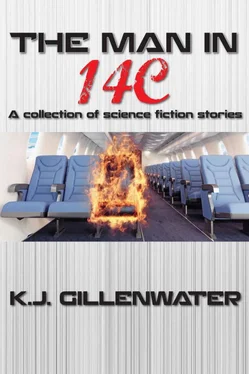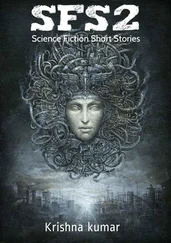Write your own story from the perspective of the passenger in Seat 14C.
Additional rules stated that it must be a positive story that includes a lot of ideas about what technology and advancements will be around 20 years into the future.
My mind burned. A muddled mess of stray thoughts, worries, and images. I’d heard the term before: chemo brain. My doctor in Tokyo didn’t understand. I didn’t know if such a term existed in Japanese.
I had looked up the word ‘fog’ on my phone and used it: “Kiri.” I’d tapped my head.
He’d nodded slowly, dawning recognition on his face. A grim set to his mouth.
The treatment I’d sought out in Japan – against the wishes of my wife, Judith – had been a failure. Most experimental treatments were iffy at best. But this one had better odds, fewer side effects. Plus, I’d always wanted to visit Japan.
When I needed my mind the most, it failed me. I couldn’t put the pieces together. Our plane sat on the runway in San Francisco in the mid-morning light. I wanted to comprehend what had happened during our flight. The odd turbulence, the flash of light, and now no one’s phone could pick up a signal. Our devices were dead. My seat companion, an older Japanese gentleman in a suit and tie, stared out the window. A woman seated across the aisle from me cried.
I wanted Judith there to explain. Her calm, cool words. Her soothing hands on my arm. A light squeeze to bring me back, straighten out my thoughts. She’d turned our house in the Berkeley Hills into a sanctuary of lavender-scented candles and ‘clean’ foods that were supposed to either cure my pancreatic cancer or slow its progress. I couldn’t remember which.
Although I’d wanted to give up (Would one more Peanut Butter Pomegranate Smoothie really do the trick?), Judith wouldn’t let me. She had a combination of femininity and toughness I admired, loved, cherished. The perfect wife for the last eighteen years.
A flight attendant made an announcement over the speaker. “San Francisco authorities have directed us to Concourse X...” Uncertainty clear in her voice, a tremble, a whisper in her co-worker’s ear. “All passengers please remain seated. Thank you.”
A din arose in the cabin. Something wasn’t right. The rumble from my fellow passengers grew. Most were Japanese. I was one of the few American passengers scattered throughout the cabin. I couldn’t understand most of the conversations around me.
I was reminded of the University of Tokyo Hospital. Doctors, nurses, patients everywhere, but my ears tuned out the language as gibberish. They’d had to call my name three times before I’d recognized it.
The Japanese man in the window seat said something and pointed. He tapped his finger on the glass. His words had a tone of excitement – or fear. I looked out the window at the runway. Instead of seeing airplanes lined up along the concourse, I saw sleek, elongated ‘planes’ with no windows and low-profile wings that hugged close to the fuselages. On these ‘planes’ were logos I’d never heard of before: Galactic Air, Aero-Blue, SpaceJet.
My mouth gaped. On the ground beneath them I saw strange cars loaded with luggage. Robotic arms grabbed each suitcase and bag, gently and quickly stowing them into a cargo hold. When complete, the cars floated away. I saw no wheels and no mechanism to move them, only a foot or so of empty air beneath.
“We have arrived at the gate.” The flight attendant announced. A different voice this time. This woman sounded more grounded in her words, more solid in relaying the news. “The authorities will be boarding the plane. We ask for your patience at this time. They have asked to address all passengers before disembarking.”
Silence fell over the cabin. Although I and the other passengers had seen impossible things outside the plane, none of use could reconcile it with our brains. Maybe I didn’t have chemo brain after all. Maybe what I’d experienced since we passed through that rough patch of air turbulence had been something more serious.
I glanced at the ‘car’ floating away outside. My stomach dropped.
What was going on?
* * *
The San Francisco Airport authorities had herded us into an airport lounge that morning, usually reserved for club members who bought first class seats and had money to spare. Some of my fellow passengers had headed straight for the bar. Some of us had sat in the cushy chairs scattered around the room. When we’d run out of chairs, someone had brought in padded folding chairs.
Two nights ago they’d swapped out the chairs for cots. We’d been trapped in the lounge ever since, as if we’d survived a natural disaster and were riding it out at a FEMA camp. News had been sporadic. Reactions mixed.
One wall of the lounge was a giant, paper thin screen. The only ‘television’ like device in the room. It came on automatically when we entered. A gorgeous image of Mount Fuji at sunset with clouds scudding by in the background filled the whole screen. The setting sun turned the mountain red, which reflected in the waters of Lake Yamanakako. The waters rippled slightly, and the picture was so clear, so rich, I wanted to reach out and dip my finger in the water. The scent of lavender filled the air.
Or did I imagine it?
The scent so familiar, so soothing made me long to see my wife, be back in my home.
I was still in shock, like the rest of the passengers. We didn’t know if we were being made fools of or if the authorities had told us the truth – the year was 2037. We’d traveled twenty years into the future. The air turbulence had not been a storm. We had passed through some kind of portal that had launched us through time.
My thoughts trickled over the meaning of what happened. Where was my family? My parents? My wife? My daughter? What would they be thinking today as they heard the news? I’m sure our hosts here at the airport – correction: spaceport – wanted to keep us in the dark because they were worried we couldn’t handle the truth, the loss of twenty years’ time and the confusion and panic that came with it.
I had no such fears. After the failure of treatment in Tokyo, I knew my life span would be short. Maybe six or nine months at most. Pancreatic cancer was a swift and deadly one. I did not expect to experience much of 2018. But here I was, a time traveler transported to a future earth. Perhaps a future earth where cancer no longer existed, where treatments and survivability had turned the corner. Maybe the impossible was already possible.
“Mr. Anthony Pasquale, Seat 14C, please come to the front.” A slim woman dressed in a perfectly tailored suit and a glossy gold blouse called me forward. She held a thin sheet of what looked like metal, the size of a notepad. Thin as a piece of paper.
I carefully made my way through the crowd. They’d only called a few other names before mine. I’d watched as each passenger was led away through the door we’d entered. Other Americans. The Japanese likely would have a bit more difficulty being reunited with their loved ones. A different process, perhaps.
“I’m Anthony Pasquale.” I smiled at the pretty blonde. Her hair was twisted into a fantastic cloud of braids and fine pieces that floated around her head, defying gravity.
She looked up from her metal sheet. I could see that it was actually a screen, but instead of the bright backlit smart phones of two decades past, the image on the screen wasn’t harsh at all. Fine 3-D images popped up from its surface. “Judith Pasquale and her husband are here to pick you up. James will escort you.” The blonde splayed her fingers through the images, they swelled, sank, and reformed into some new 3-D image.
I couldn’t grasp the technology nor the information she accessed. I wanted to find something familiar in this future world, but was having difficulty. At forty-two, I’d felt very comfortable in the technology of my era. I considered myself knowledgeable. Already I could see catching up would be difficult.
Читать дальше












